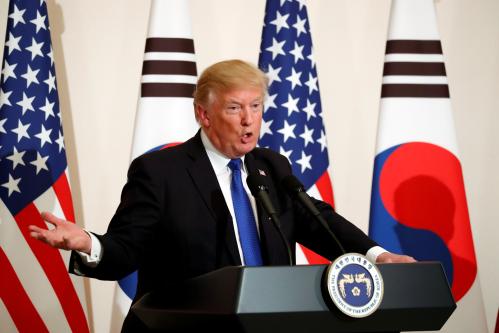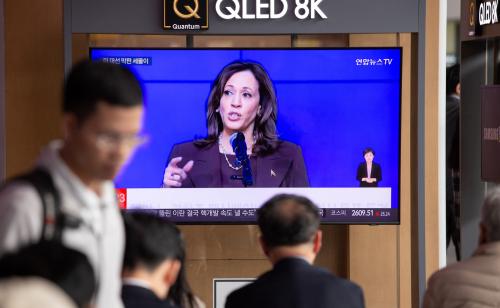Things are about to get very complicated regarding North Korea, writes Jung H. Pak. That’s why the White House should appoint a special envoy, with President Trump’s stated confidence, to take advantage of the opportunities of shifting dynamics and manage the maximum pressure process, while presenting this individual as a channel for potential engagement. This piece originally appeared in The Hill.
Ties between the United States and North Korea have been on ice, as Pyongyang’s intransigence on denuclearization and Washington’s refusal to engage without such a commitment from the Kim Jong-un regime have stymied engagement.
But recent developments at the Winter Olympics in Pyeongchang—including Pyongyang’s invitation to South Korean President Moon Jae-in to visit North Korea for a summit with Kim and Vice President Mike Pence’s statement that the Trump administration is willing to talk to North Korea—set off speculation about what this means for the United States’ North Korea policy.
Pence’s comment about “maximum pressure and engagement at the same time” and his apparent role in coordinating with President Moon and President Trump are welcome developments, amid fears about a “bloody nose” strike against North Korea leading to a devastating military conflict and reports about fissures in the U.S.-South Korea alliance as a result of Kim’s outreach.
But things are about to get very complicated. That’s why the White House should appoint a special envoy, with President Trump’s stated confidence, to take advantage of the opportunities of shifting dynamics and manage the maximum pressure process, while presenting this individual as a channel for potential engagement.
This envoy should be a seasoned national security professional and respected statesperson who is able to navigate this intensely political environment with White House and bipartisan support and deftly manage alliance relationships.
Such an individual would be critical at a time when South Korea is unlikely to get a U.S. ambassador in place for months or longer, and as President Moon himself considers appointing a special envoy to North Korea as inter-Korean relations seem to be heating up.
The presidential envoy would help to maintain and intensify the maximum pressure campaign and ensure coordination among allies and other international partners, including through shuttle diplomacy with Seoul, Tokyo, Beijing and Moscow.
It is critical that there is no daylight between the U.S. and other key stakeholders; Kim’s tactics to divide and conquer must not be allowed to succeed.
Even if Pyongyang engages, and even if it does not conduct a missile or nuclear test, the Kim regime will almost certainly continue developing its nuclear weapons program and using its olive branch to South Korea to buy time.
The perceived warming of inter-Korean and U.S.-North Korea relations creates the potential for Beijing, Moscow and the international community to relax sanctions implementation—if they haven’t already. This would unravel the progress that Washington has accomplished so far.
This would be a mistake that we need to avoid, especially since Pyongyang’s Olympic outreach is probably a response, in part, to the strength of sanctions and the Trump administration’s reported consideration of a military strike against North Korea.
Given the uncertainties about how the North Korea issue will unfold over the coming weeks and months, the special envoy should lead the U.S. effort in convening, crafting and executing coordinated strategies about how to get ahead of North Korea’s potential maneuvers.
North Korea doesn’t do summits for free, and it will continue to test U.S. resolve and Seoul’s appetite for improving inter-Korean ties at the expense of its alliance with Washington.
For example, it is entirely conceivable that Pyongyang would demand monetary compensation, the elimination of sanctions or another postponement of U.S.-South Korea military exercises.
It could also orchestrate a plausibly deniable conventional attack against South Korea (to show its displeasure at the pace, scope and substance of potential engagement) or announce a space launch—which it would claim is a “peaceful use of space.”
An effective special envoy would be able to explore the range of actions that the international community is prepared to take if North Korea continues on its current path or if, in the less likely scenario, there are credible signs that Pyongyang is willing to have a meaningful discussion on relinquishing its nuclear weapons program.
In the event of possible high-level U.S.-North Korea dialogue, the president’s envoy would be a critical interlocutor to the Kim regime, which has been trying to get a handle on how to read President Trump.
At a minimum, in any engagement scenario, the envoy would reduce the potential for miscommunication and miscalculation that could spiral into a military confrontation. This envoy might also be able to puncture the groupthink within Kim’s circle and present the North Korea leader with what’s really at stake.
As CIA Director Michael Pompeo said recently at a Washington event: “We’re concerned that [Kim] may not be getting really good, accurate information.”
As we have seen in the lead up to the Olympics, North Korea is skillful in playing games. By appointing a White House special envoy on North Korea and relaxing the condition for talking with North Korea, the Trump administration can capture the initiative from Kim Jong-un and put pressure on him to engage seriously on his nuclear program.
The Brookings Institution is committed to quality, independence, and impact.
We are supported by a diverse array of funders. In line with our values and policies, each Brookings publication represents the sole views of its author(s).





Commentary
Whither maximum pressure? Why we need a White House special envoy on North Korea
February 14, 2018